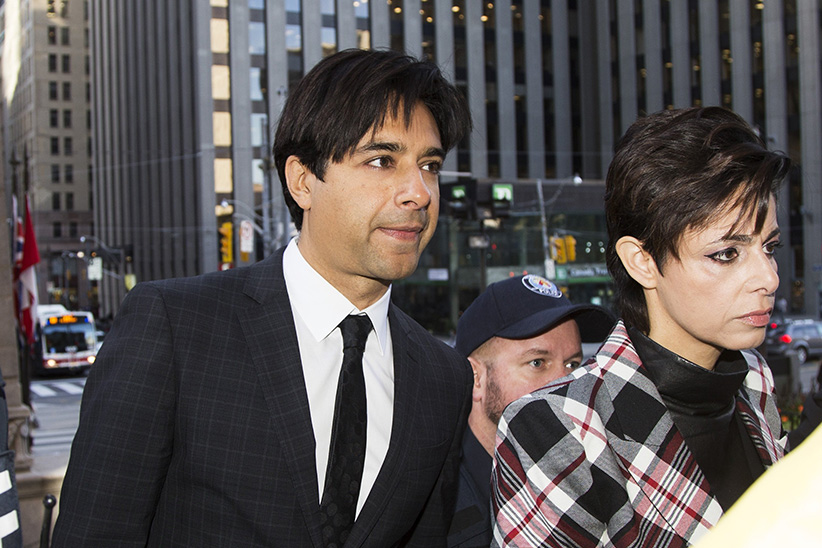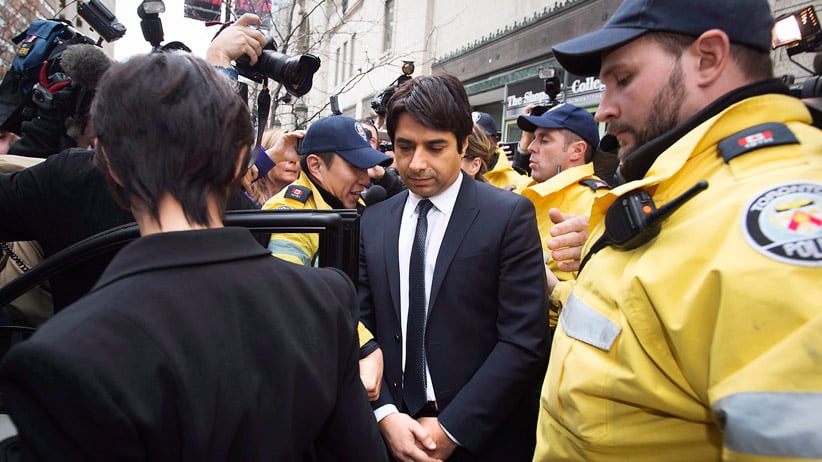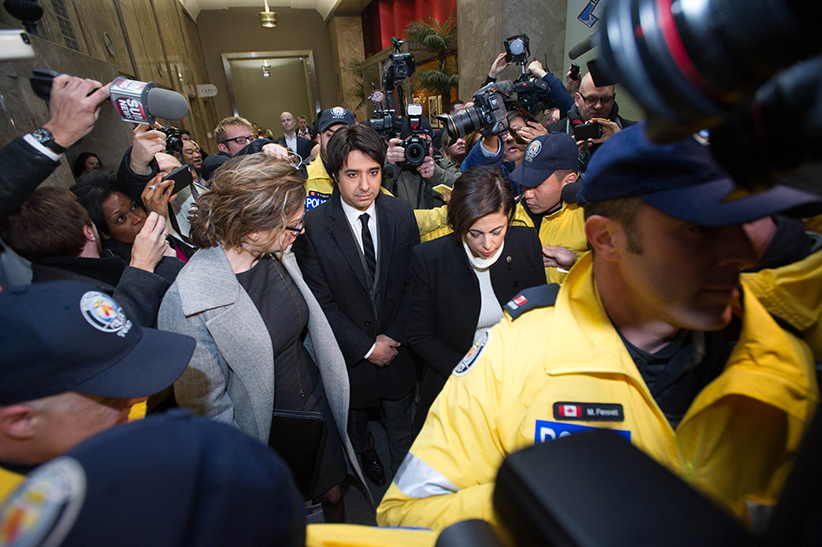What was really on trial in the Jian Ghomeshi case
Why women in sexual assault cases may be worse off than ever
Share

Update, March 24: Jian Ghomeshi has been found not guilty of sexual assault and choking. The judge in the case said the complainants were simply not credible.
The world was reminded again recently of how alleged victims of sexualized violence are uniquely shamed and blamed for a crime they didn’t commit, after an 18-year-old woman reported being gang raped in a Brooklyn park earlier this month. In the woman’s telling, she and her father were approached by five teenagers, one wielding a gun; her father was ordered to leave and she was sexually assaulted. The accused, aged 14 to 17, predictably told a different version while in custody. Yes, sexual activity occurred, their lawyers said, but it was consensual, contrary to police reports stating the young woman had been visibly traumatized and injured. They claimed a cellphone video taken by one of the boys showed the woman “smiling” and “laughing.” Then the capper: they reported the woman had been drinking alcohol with her father and made the outrageous claim the pair were having sex, a charge denied by the father. (The woman has not spoken.)
The media had a field day impugning the woman. Questions, none related to the actual incident, piled up, including why her father took so long to contact police. On CNN, reporter Pamela Brown tried to dig for dirt in an interview with New York City councillor Laurie Cumbo, asking what Cumbo knew about reports the alleged victim “was drunk, combative, and that she bit a police officer and she initially refused treatment.” In a response that went viral, the councillor decried the typical questioning of people alleging sex crimes—the “Was she drunk?” “Was she properly dressed?” “What time was it?” line of inquiry. “We need to focus on those five individuals who committed this heinous crime and what were the bad decisions they made all throughout the day,” Cumbo said. “Have they been drinking? Have they been smoking? What would click in someone’s mind to think that something like that was okay?”
Canadian criminal defence lawyers concur. “There’s far too much scrutiny of the victim in sexual assault cases,” Toronto lawyer Susan Chapman says. “It’s unparalleled.”
Just how unparalleled will be on display on Feb. 1 when Jian Ghomeshi’s criminal trial commences at Toronto’s Old City Hall; the former CBC Radio host faces four charges of sexual assault and one charge of overcoming resistance by choking (a fifth sexual assault charge will be tried in June). Last fall, in a bid to forestall the inevitable glare on Ghomeshi’s four accusers, Gillian Hnatiw, the Toronto lawyer representing Lucy DeCoutere (the only complainant to request not to have a publication ban on her name) issued a statement: “Fundamentally, the case is about the alleged behaviour of Mr. Ghomeshi,” it read in part. “It is important to victims everywhere that we remain focused on that fact.”
The directive is noble, if unrealistic, given the way sexual assault cases are tried in this country. Ghomeshi’s lawyer, Marie Henein, is known for cross-examination likened to “a machete” in a recent Toronto Life profile. That descriptor is gentle, say lawyers who know her: “Those women don’t know what they’re getting into,” says one.
Related from Anne Kingston: Everything you need to know about the Jian Ghomeshi trial
R. v. Jian Ghomeshi will put klieg lights on the most common sexual-assault allegation scenario, and the most difficult to prove beyond a reasonable doubt. It involves an accused who’s known to the complainant— in contrast to a “stranger in the bushes”; all three complainants in this case socialized with Ghomeshi before and after the alleged assaults, which date back to 2002 and 2003. It is also typical that reporting of the assaults was delayed.
The trial is destined to expose the try-the-accuser prosecution of sexual assault, an area of criminal law in need of radical overhaul, according to those who work within it. Thirty years after significant changes were made to the Canadian Criminal Code to remove the stigma and stereotypes surrounding sexualized violence—including the introduction of rape shield provisions to prevent an accuser’s sexual history being aired in court—women coming forward with sexual assault allegations are worse off than ever. Sex crimes continue to be treated singularly within the law. No one asks the victim of a mugging why they handed over their wallet, or what they were doing in that neighbourhood, or question whether the crime even took place. We know false claims are the anomaly (two to eight per cent, according to FBI studies). Yet disbelieving the complainant remains the norm. Conviction rates have not risen a whit: according to the 2012 study “Sexual Assault in Canadian Law” they stand at 0.3 per cent. And complainants are still on trial. Consider the defence lawyer slang for questioning those who dare come forward: “whacking.”

It may seem inflammatory to suggest women are worse off now compared to a time when marital rape had just been labelled a crime. Changes to the Criminal Code were intended to improve how courts treated complainants, almost always women, and to broaden understanding of sexual assault. “ ‘Sexual assault’ replaced ‘rape’ to eradicate that false, almost pornographic focus on penetration and to try to address in generalized terms the actual harm experienced by victims,” explains Toronto criminal lawyer David Butt. That’s a particularly invasive form of violence, he says, “one that violates sexual integrity.” We’ve also seen decades of research into and education about sexualized violence—“White Ribbon” campaigns (Ghomeshi was a vocal supporter), “No means no” initiatives.
Related from Chatelaine: Lucy DeCoutere on nightmares, healing and the Jian Ghomeshi case
Yet those working within the system note changes unanticipated when laws were rewritten decades ago—like cellphones and social media—which render rape shields porous and that breach complainant privacy in new ways. Twenty years ago, complainants protected by publication bans weren’t at risk of online bullying and harassment. And there was no risk of defence lawyers combing through Instagram and Tinder to seek out incriminating pics or posts to create reasonable doubt. All of that makes coming forward fraught in ways it wasn’t a generation ago.
Today, a “because it’s 2016” belief in female sexual agency can be used against complainants. That women freely go out at night, dress as they want, and enjoy sex outside of marriage has made it plausible to suggest a woman would consent to sex with five boys, one of them armed, in a public park or, in the case of Rehtaeh Parsons, consent to sex with two boys at a party while vomiting out a window. At the same time, the courts often uphold a Victorian model of prim womanhood in which women would experience such violation and shame after a consensual sexual encounter that they would fabricate a claim or seek revenge.
“There’s much higher sensitization to sexual assault, its impact and the seriousness with which it has to be treated,” says Butt. “But will you have more success [as a complainant]? No. And that’s the problem.” Sexual assault remains the most unreported (only eight per cent reported in 2004, according to Statistics Canada’s crime victimization survey, which interviews women anonymously) and underprosecuted of offences. Lawyers regularly discuss whether they’d advise a loved one to report a sexual assault, says Butt. “I’ve had countless conversations with police officers, judges, defence lawyers, attorneys— and at end of the day we shake our heads.”

Sexual assault trials are unique in our justice system in that there is dispute over whether the crime happened at all—even though disappearance of money or a car can be just as difficult to prove. “Typically, there’s no question of whether somebody was injured or money was stolen,” Hnatiw tells Maclean’s. “The actus reus part—whether the crime occurred at all—is rarely in play, but that’s a common defence in sexual assault.”
The accused’s right to a vigorous defence, combined with presumption of innocence, creates an inevitable “he said/she said” showdown, even though the law recognizes consent is subjective: “There is no such thing as implied consent in sexual assault,” says Toronto criminal lawyer Jonathan Rosenthal. “Consent is viewed though the eyes of the victim.”
Yet those who come forward aren’t treated as autonomous agents. They’re subject to publication bans (also employed to protect children)—which telegraphs the message that being a victim of sexualized violence is shameful. The ban is problematic, lawyers say. “It tries to ameliorate any embarrassment that complainants have been sexually assaulted and have to face this horrible experience in the courtroom,” says Butt. “Is it paternalistic? Yes.”
In an ironic twist, sexual assault complainants aren’t asked to consent to the ban; they have to opt out, as DeCoutere did. That sends a signal too, says Hnatiw: “For a lot of women, coming forward and laying charges is about regaining control over a horrific event in their lives. Being told, ‘Well these are the terms on which you can do it’ can be further disempowering.”
That, of course, is just the start. Accusers in sexual assault cases have their personal history laid bare in a way not seen in other criminal prosecutions, a double standard summed up by Kate Harding in the recently published Asking For It: The Alarming Rise of Rape Culture and What We Can Do About It: “Imagine if every pedestrian who reported being hit by a car were thoroughly investigated for evidence of suicidality, while the driver’s claim of ‘I didn’t see him there,’ would be reason enough to drop any charges.”
Rape shield laws can be skirted: it’s possible to bring application in writing under Section 276 of the criminal code for “relevant” details on a complainant’s sexual history, as Henein did in the Ghomeshi case. These applications are supposed to be rare, but they’re common, says Chapman. “And they continue to succeed in two scenarios: to probe prior victimization and to probe the relationship between the perpetrator and the complainant.”
Cellphone content further extends the scope of admissible evidence: “If you walked in with a briefcase of medical records and tax returns, they wouldn’t say, ‘We’re going to ask you for that,’ because it doesn’t seem relevant,” says Chapman. “But [information that] shows up on your phone—all contacts, pictures—the Crown is routinely collecting that info, which then has to be disclosed to the defence. It used to be women could pick up the phone and talk to their friends, but now there’s a permanent recording or messaging.”
If that strategy is used in the Ghomeshi defence, it will be all the more galling, given the collective catharsis of women speaking out and supporting each other, seen in the #BeenRapedNeverReported hashtag that trended on Twitter after allegations mounted against Ghomeshi. Such communication between complainants can be framed as collusion or conspiracy in court, a tactic many expect Henein to employ. The idea that there’s something suspicious about communication between women is antiquated, says Hnatiw, citing the Cosby case: “If you are one of the women at the eye of that unique, very public storm, who else are you going to talk to about that experience? But the gloss that gets put on that in criminal courts is that it’s copycat or fabrication.”
More from macleans.ca: Jian Ghomeshi: How he got away with it
Legal experts point to another ongoing problem: The very red flags used to discredit the witness and raise “reasonable doubt”—why didn’t they come forward earlier, why did they see the defendant again (both expected to be deployed by Henein)—reflect dynamics of how sexualized violence actually occurs. “Yes, she was giggly at the party, she did have too much to drink, and she did kind of like this guy beforehand,” says Chapman. “But all that dropped at a certain point of time. It’s not unusual. It shouldn’t be used against your credibility.” It’s also common to wait to report, if report at all, when the accused is in the same social circle. “Most people try to forget and move on, or they rationalize or they focus on mental health and well-being as opposed to engaging in the criminal process,” says Hnatiw.
But enduring rape myths continue to animate sexual assault cases, lawyers say. Among the most prevalent: the “woman-as-sexual gatekeeper” model in which sexual assault is dismissed as “sex gone bad,” not criminal behaviour. During an infamous 2014 Alberta trial, Justice Robin Camp, now a federal judge, questioned the 19-year-old woman who alleged being sexually assaulted over a bathroom sink during a house party: “Why couldn’t you just keep your knees together?” and “Why didn’t you just sink your bottom down into the basin so he couldn’t penetrate you?” he asked. He acquitted the man, referring to the alleged rape as misbehaviour. The ruling was overturned on appeal and is set for retrial. (Camp remains on the bench but will be steered away from cases involving “sexual conduct”; he vowed to “undertake a program of gender sensitivity.”)
While the “formal culture” of the court is resolutely committed to “the utter rejection of those myths,” says Butt, the informal culture—“what actually happens in the courtroom”—can allow them to slip through, “which is why it is so notoriously difficult to get convictions in acquaintance sexual assault scenarios.”

To change that reality, Butt and others are advocating for specialized sexual assault courts like those that exist for criminal cases involving drugs and mental health; these will entail a subset of judges with special training in the psychological dynamics of sexual assault and lawyers for complainants. “A one-size-fits-all criminal justice model doesn’t fit the reality of sexualized violence by the people who are experiencing it,” Butt says.
Complainants’ access to lawyers, destined to be controversial, could even out a lopsided playing field. As it stands, accusers appear as witnesses in the people’s case against the alleged perpetrators; they’re not given counsel of their own. “They have few people they can speak to with any confidence,” says Hnatiw. “If they go to a therapist [they] are at risk of having therapy records exposed. They cannot speak to the Crown with any frankness because they’re under obligation to disclose their statements to the defence. Friends or any formal support network can be subpoenaed as well.” A lawyer would also provide witness prep: “To be thrown on the stand and be subject to adversarial cross-examination is retraumatizing for many.”
Butt would also like to see the burden of proof lowered from “beyond a reasonable doubt” to a balance of probability, as well as reduced penalties. “The bar is so high,” he says, “that even if the defendant is remotely believable, the law says a conviction won’t happen.” He’s prepared for criticism that reduced penalties are soft on sexual assault. “My answer is: with a conviction rate of three in 1,000, being hard is sure working well for us, isn’t it?” He rejects the suggestion that lowering the burden could make it easier to be convicted: “The change in direction should only be at the conclusion of a thorough and professional investigation.”
He believes a parallel court is the only way change can come: “We either continue to rearrange deck chairs on the Titanic or we consider taking a completely different direction and explore ways that we can be responsive to the needs of victims of sexualized violence by seeking, and gaining for them, some sort of accountability.” Chapman agrees: “Most women just to want it known it happened and this matters. Time and time again I talk to women who’ve experienced the most devastating thing in their life, and say, ‘What would you like to see happen? If he was prepared to apologize would that make any difference?’ And they say ‘Absolutely.’ ”
A spirit of change is in the air. Last year, University of Windsor law professor David Tanovich called for “ethical lawyering” in sexual assault cases in “Whack no more,” published in the Ottawa Law Review: “It is time to address the discriminatory lawyering and denial of access to justice that is taking place in these cases,” he wrote. Whether such sentiment will affect Marie Henein’s much-anticipated performance remains to be seen.